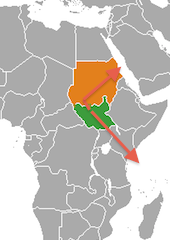Japan Upsetting China’s Balance Between the Sudans?
Will closer ties between Japan and South Sudan undo China’s diplomacy in the region — and hurt its investments?
August 3, 2013

On June 21, 2013, Sudan’s President Omar al-Bashir threatened once more to stop oil exports from South Sudan.
He claimed he would cut them off unless the neighboring country ceased its alleged support for rebel groups fighting in Sudan’s border regions of South Kordofan and the Blue Nile.
The government of South Sudan has repeatedly dismissed these accusations.
Oil exports had only resumed a month earlier, after being closed down in January 2012, due to oil transit fees disagreements between the two African countries.
An actor likely to be displeased by this saber-rattling is China, a key investor and trading partner for both countries.
Holding interests in both countries, China has actively focused on mediating the Sudans’ tensions. China wants South Sudan’s oil to continue passing through Sudan.
Meanwhile, another investor, Japan, which has significantly fewer ties to Sudan, has announced plans to build a new pipeline out of South Sudan through Kenya, which would by-pass Sudan. This could thoroughly disrupt China’s interests in both countries.
When South Sudan finally seceded from Sudan in 2011, after 40 years of dire civil war, China was caught in a game-changing situation.
It was one that China couldn’t have anticipated as it first entered Sudan in 1996 when The China National Petroleum Corporation (CNPC) bought its first oil shares.
Prior to partition, China had focused more of its investments and loans toward northern Sudan, with little focus on what is now an independent South Sudan. Currently, CNPC holds a 40% stake in the Greater Nile Petroleum Operation Company (GNPOC).
China is Sudan’s biggest investor. It has also considerably invested in building 1,500 km of pipelines, countless refineries as well as the development of Port Sudan on the Red Sea.
China is also Sudan’s largest trade partner, as it imports around 70% of Sudan’s oil, while the African country imports low-cost items and armament from its Asian partner.
However, South Sudan 2011 secession from Sudan upended China’s plans and interests. South Sudan obtained 75% of the oil reserves situated on the border between the two neighbors. This represented 98% of the newly created state’s revenues.
Immediately after South Sudan gained independence and most of Sudan’s oil, foreign oil companies, including Chinese ones, flocked to the southern capital city of Juba. Their goal was to establish relations with the new government.
The foreign investors were all welcomed reluctantly by South Sudan. Foreign investors were blamed for supporting Khartoum in crushing the South Sudanese rebels and destroying villages during a civil war that ran for decades, killing more than two million people.
China had made some efforts prior to South Sudan’s independence to establish some ties in the country, especially after South Sudan became autonomous in 2005.
In 2008, China established a consulate in Juba and the CNPC started funding projects in the then autonomous Sudanese region.
After independence, China intensified its efforts. China became South Sudan’s biggest oil investor and consumer, importing over 82% of the country’s oil.
In April 2013, China approved a new major loan scheme to help improve South Sudan’s infrastructure.
While there are other routes to export the South Sudanese oil, including through Kenya, China is interested in continuing to use Sudan’s infrastructure and equipment, because it has paid for almost of all of it.
While it may have obtained most of the oil reserves, South Sudan is a landlocked country that lacks infrastructure. China depends on South Sudan’s northern neighbor for pipeline infrastructure, refineries and export terminal at Port Sudan necessary to trade it.
The relation between the two neighbors has been more than tense over the past two years.
After South Sudan’s secession, the two countries failed to reach an agreement regarding oil transit fees. Nevertheless, South Sudan kept exporting oil, on the understanding that it would repay Sudan as soon as a deal was reached.
After several months of negotiations, during which South Sudan collected around $3 billion in oil revenues, even as Sudan’s economy was crumbling, in January 2012, Khartoum seized several million barrels of oil invoking non-payment of transfer fees.
In response, Juba closed all of its wells, without consulting its foreign investors and donors, including the Chinese ones.
The southern government apparently forgot that this would eliminate 98% of their revenues and the source of nearly all its foreign currency almost overnight.
Several weeks after the shutdown, South Sudan’s oil ministry expelled Liu Yingcai, head of the Chinese-led Petrodar consortium. The consortium pumps most of the country’s oil.
The ministry accused his company of assisting Sudan in seizing the oil resources, among other allegations. The company affirmed its transparency and ethical conduct.
Nevertheless, South Sudan reconsidered its attitude toward China when it realized that Western governments were also no longer willing to invest without the oil flows.
With no proposals to create a pipeline through Kenya, bypassing Sudan, the African country was left in the situation of asking China for loans in April 2012.
China has politely dismissed South Sudan’s decision to close its wells as a mixture of inexperience and desire to reveal its sovereignty. The oil exports through Sudan were finally resumed in April 2013, when South Sudan and Sudan reached an agreement.
In striving to protect its interests in both Sudan and South Sudan, China not only ended up offering aid to both Sudans, but it has also come to play a mediator role between them, by constantly promoting dialogue between the two countries, through a mixture of diplomatic pressure and promises of aid.
The two countries seem to accept this role. Most recently, in April 2013, as tensions were building between the two neighbors, South Sudan asked the Chinese ambassador to Juba to complain about the blockage of oil flow through Sudan.
While typically maintaining an international policy of non-interference in its partners’ internal affairs, China does tend to engage with powerful local actors.
This becomes especially apparent when its access to resources and investments are endangered, as is the case with its Sudanese oil companies.
But even as China is scrambling to get the two countries to cooperate, Japan has recently accepted an offer to construct an alternative pipeline from South Sudan to Kenya’s Lamu port.
Since the nuclear disaster in Fukushima in March 2011 prompted a rapid drop in desire to rely on nuclear energy, Japan’s demand for oil has quadrupled.
It is especially interested in South Sudan’s low-sulfur fuel oil (LSFO). Since South Sudan is Japan’s second-largest supplier of LSFO, during the Sudanese oil shutdown, Japan’s power utilities were forced to pay a premium in order to obtain LSFO from other sources.
As opposed to China, Japan has no interest in Sudan as such, since it never invested in the northern-based GNPOC or in constructing Sudan’s infrastructure and equipment.
Instead, Japan has gradually started to invest in infrastructure development in the south. Japan is, for example, currently providing technical assistance and the construction of a new $100 million bridge over the Nile River in Juba.
If Japan becomes a reliable partner for South Sudan, this could be seen by the country as an opportunity to reduce its dependency on China’s loans and investments and to bypass Sudan.
However, it should avoid taking these dangerous steps, given that a new pipeline would have the rather predictable negative consequence of destabilizing the delicate oil balance that allowed a peaceful partition.
With the loss of the actual oil reserves of the South, the northern government in Khartoum has made do with transit fees on southern oil moving across its territory. And it keeps both governments interdependent enough to avoid war.
A Kenyan pipeline would give South Sudan an alternative, reducing its imperative to cooperate with Sudan for its own survival. It might even make the northern pipelines entirely redundant, thus costing Sudan its transit fee revenues.
Moreover, China is not interested in losing influence over South Sudan or in seeing a new pipeline jeopardize its many investments in Sudan.
This is especially true if the pipeline is to be built by Japan, with whom China has been experiencing increasing tensions in the East China Sea.
Should the plan move forward, China would undoubtedly seek to retaliate against both South Sudan and Japan. The Chinese could threaten to withdraw their funding from South Sudan.
As for Japan, China might impose economic pressure, by boycotting its products, which it had done in the past.
More importantly, Sudan should not be left out of the new pipeline scheme, because the government in Khartoum will not tolerate South Sudan diversifying its oil routes, given the extent to which its own economy depends on oil transit.
Sudan would most likely retaliate by rekindling conflict between the two countries and by trying to recapture its former oil-producing regions.
This would lead to further devastation, compromising the interests of all involved actors, while continuing to harm the population.
It seems that for the people of the two Sudans, oil remains perpetually a curse, bringing suffering and poverty, rather a blessing ensuring prosperity.
Takeaways
China's policy of non-interference in its partners' internal affairs is a facade once resources are at risk.
There are other potential routes to export the South Sudanese oil, including through Kenya.
China is interested in continuing to use Sudan's infrastructure and equipment, because it paid for it.
In striving to protect its interests in Sudan and South Sudan alike, China ended up offering both aid.
China is Sudan's biggest investor, having built 1,500 km of pipelines and countless refineries.
If Japan becomes a reliable partner for South Sudan, this could reduce its dependency on China.
For the people of the two Sudans, oil seems to remain a curse, rather a blessing ensuring prosperity.
Read previous

Larry Summers Reloaded
August 2, 2013
